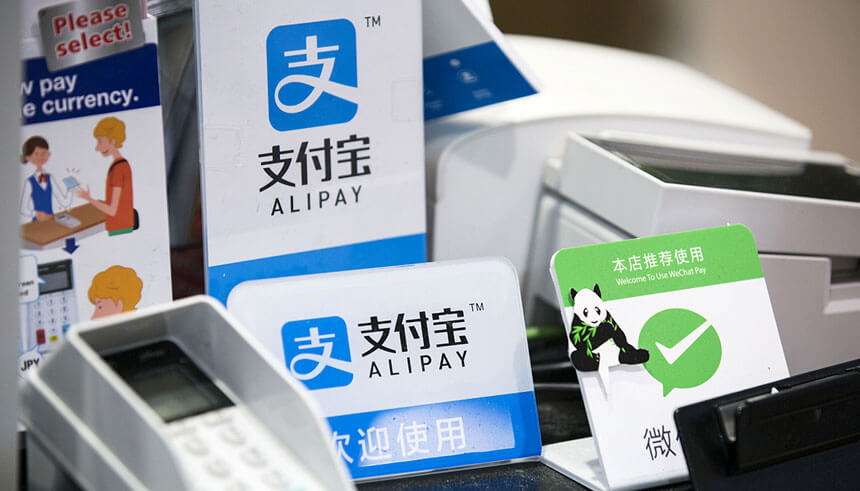US-Asia Business
US-China Market Watch: Amazon, Trade Deal, Alipay and WeChat Pay
By Angela Bao

Your monthly roundup of the latest US-China business and industry news.
U.S.-China trade negotiations moving forward
After mixed signals about trade negotiations, a report has indicated that a partial trade deal could be reached before December 15, when new tariffs on $156 billion worth of Chinese goods are expected to go into effect. President Trump has previously stated that a trade agreement might not come until after the 2020 elections, but sources close to the matter say that those comments were “off the cuff.” A week prior to those remarks, Trump had said that the trade deal was in its “final throes.”
The “phase one” deal was originally expected to be signed in November. China has been pushing for the U.S. to roll back existing tariffs on $350 billion worth of Chinese goods, although Mr. Trump has signaled reluctance to do so. In any case, the Chinese government has invited U.S. Trade Representative Robert Lighthizer and Treasury Secretary Steve Mnuchin to Beijing for further in-person negotiations.
Mr. Trump also signed into effect a bipartisan bill that would require sanctions against China if the government cracks down on protestors. He admitted that signing the bill would not make trade negotiations easier, but still believes China wants to make a deal.
Amazon opens pop-up on Pinduoduo
Amazon.com Inc. announced that it will open up a pop-up store on Chinese e-commerce site Pinduoduo that will run until the end of the year. Amazon will provide a curated selection of over 1,000 foreign products as part of their strategy to focus on selling foreign goods to Chinese consumers, after it shut down its marketplace-selling services in China earlier this year.
Amazon also has a storefront on Alibaba’s Tmall, but the decision to open a pop-up on the four-year-old Pinduoduo marks how quickly the company has gained prominence, especially among shoppers in rural China. Described as a “social e-commerce” startup, Pinduoduo differs from its rivals Alibaba and JD.com by allowing buyers to team up with other shoppers in their network to bulk-buy items and get lower prices.
Alipay and WeChat Pay now can link foreign cards
China’s two most popular mobile payments apps, Alipay and WeChat Pay, can now be linked to foreign credit cards and debit cards. Previously, people could only use Alipay or WeChat Pay if they had a Chinese bank account, which sometimes made it difficult for tourists to pay for things in China’s mobile-centric economy.
Ant Financial, an affiliate of Alibaba Group that runs Alipay, announced that it was launching a version of the app that would support Visa, Mastercard, Japan’s JCB and Singapore’s Diners Club cards. Tencent, which runs WeChat Pay, said it would also support those same cards, in addition to American Express.
Tencent eyes U.S. expansion with Nintendo partnership
A Tencent official told the Wall Street Journal that the company, which is the world’s largest video game company by revenue, is looking to expand beyond the Chinese market and into the U.S. and Europe. Tencent’s strategy is to create console games with Nintendo characters (Tencent announced its partnership with Nintendo in April of this year) to attract gamers in its target markets. The tech giant also owns stakes in game makers Epic Games (“Fortnite”) and Activision Blizzard (“Call of Duty”).
The move comes after Chinese regulators started cracking down on China’s domestic gaming industry, such as putting time restrictions on players under 18 and putting freezes on new video game licenses in 2018.
Popeyes aims to overtake KFC in China
U.S. fried chicken chain Popeyes has signed a lease in Shanghai to open its first store in China (scheduled to open next year), as it accelerates its global expansion and aims to become China’s number one chicken brand.
Back in July, Popeyes’s owner, Restaurant Brands International, announced a deal to develop 1,500 storefronts in China over the next 10 years. In contrast, Yum China, which owns Popeyes’s main competitor KFC, has some 6,300 KFC stores across the country and was the first Western fast food franchise to enter China in 1987.
Sign up for the Reach Further Newsletter
We’ll keep you in the know about the latest US-Asia business news and trends.
Suscríbase al boletín Reach Further
Lo mantendremos informado sobre las últimas noticias y tendencias comerciales entre Estados Unidos y China.

